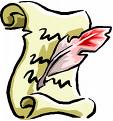


Manly Deeds, Womanly Words
Manly Deeds, Womanly Words
Remember Carroll's sacred trust, Remember Howard's warlike thrust,-
And all thy slumberers with the just, Maryland! My
Maryland!
from poem written by James Ryder Randall. http://en.wikipedia.org/wiki/Maryland,_My_Maryland










Maryland, 1776, Preamble.
We, the people of the state of Maryland, grateful to Almighty God for our civil and religious liberty...
A man shall be satisfied with good by the fruit of his mouth: and the recompence of a man's hands shall be rendered unto him.
Proverbs 12:14










I lament that we waste so much time and money in punishing crimes and take so little pains to prevent them…we neglect the only means of establishing and perpetuating our republican forms of government; that is, the universal education of our youth in the principles of Christianity by means of the Bible; for this Divine Book, above all others, constitutes the soul of republicanism.........By withholding the knowledge of [the Scriptures] from children, we deprive ourselves of the best means of awakening moral sensibility in their minds.
Benjamin Rush, Letter written in Defense of the Bible in all schools in America, 1790's
Institution of Higher Learning
1782 Washington College, Maryland http://about.washcoll.edu/georgewashington.php
Liberty Hall (subsequently Washington & Lee), Virginia "Not
Unmindful of the Future"
When
Washington and Lee's men fall in line,
We're going to win again another time;

Washington College: Founded by the Reverend William Smith, it was the first college in the new nation dedicated to preparing citizens of a new democracy. George Washington gave a founding gift of 50 guineas and his service on the Board of Visitors and Governors for five years just before his presidency, and he consented to have the college named in his honor. His gift was the largest made toward the College's founding in 1782 and was used to purchase scientific equipment. In 1789, Washington accepted an honorary degree.
"Washington College had evolved from the Kent County School, an institution of more than sixty years' standing, thanks to the efforts of the Reverend Dr. Smith, who came to America in 1751 and served the College of Philadelphia (now the University of Pennsylvania) as its first provost from 1759 until its charter was revoked." from http://www.washcoll.edu/wc/visitors/collegehistory.html http://www.washcoll.edu/wc/visitors/collegehistory.html
Historical Perspectives - Annapolis "All four Maryland signers of the Declaration of Independence had town homes in the city - William Paca, Thomas Stone, Samuel Chase, and Charles Carroll."
http://www.clipartguide.com/_search_terms/flower_blooms.html
From early governing documents:
|
"Article XXXIII. That, as it is
the duty of every man to worship God in such manner as he thinks most
acceptable to him; all persons, professing the Christian religion, are
equally entitled to protection in their religious liberty; wherefore no
person ought by any law to be molested in his person or estate on account of
his religious persuasion or profession, or for his religious practice;
unless, under colour of religion, any man shall disturb the good order,
peace or safety of the State, or shall infringe the laws of morality, or
injure others, in their natural, civil, or religious rights; nor ought any
person to be compelled to frequent or maintain, or contribute, unless on
contract, to maintain any particular place of worship, or any particular
ministry; yet the Legislature may, in their discretion, lay a general and
equal tax for the support of the Christian religion; leaving to each
individual the power of appointing the payment over of the money, collected
from him, to the support of any particular place of worship or minister, or
for the benefit of the poor of his own denomination, or the poor in general
of any particular county: but the churches, chapels, globes, and all other
property now belonging to the church of England, ought to remain to the
church of England forever...
Article XXXV. That no other test or qualification ought to be required, on admission to any office of trust or profit, than such oath of support and fidelity to this State, and such oath of office, as shall be directed by this Convention or the Legislature of this State, and a declaration of a belief in the Christian religion." Maryland State Constitution, 1776 |
The early settlers developed colonial charters that were decidedly evangelical in their purpose, often expressing a goal for their colony to advance the Christian religion. As the country progressed up to the revolutionary war period, state constitutions evolved from the charters. Those state constitutions served to maintain the order already established by the original charters, the charters based on Christianity.
Throughou
t the seventeenth century, Catholics in England were harassed and abused. For this reason, Catholic George Calvert obtained a charter in 1632 for territory (Maryland) in America. In 1634, approximately two hundred Jesuit and Catholic settlers left England on two ships. They were thankful God had guided them to a glorious new land.
Father Andrew White (1579-1656), described the celebration of the first mass upon the arrival of the ships to Maryland, the Ark and the Dove, "We celebrated mass for the first time...This had never been done before in this part of the world. After we had completed the sacrifice, we took upon our shoulders a great cross that we had hewn out of a tree, and advancing in order to the appointed place...we erected a trophy to Christ the Savior, humbly reciting, on our bended knees, the Litanies of the sacred Cross, with great emotion."
In 1689, the Protestant Church of England was legally established in the colony and penal laws were enforced against non-Protestants. Though Catholics were free to remain Catholics and worship quietly in private, they were not allowed to vote, hold office, or worship publicly. The Catholics became increasingly fewer in number, but those few did not give up their faith, hope, or convictions.